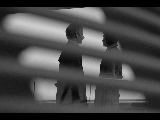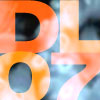 (JB) I'm a big video games geek, so I'd really like to like Second Life. Thus, I eagerly attended Fridays's show of further SL performances, concluding the festival's small detour into VR realms curated by Olga Wunderlich. As I noted in my first SL rant, the essential thing to look out for might be the performative aspect here, and the first part of the programme was a screening of a real-time performance by Juria Yoshikawa and Noizz Papp which somehow reminded me of the most traditional ideas of collaborative art, or, more precisely, artistic community. To an ambient tune provided by Noizz Papp, Juria Yoshikawa conducted a kind of virtual, kinetic ballet performance, in which every participant would change his pre-programmed outfit at his command; the outfit not only providing a costume & an array of brightly coloured shapes around the player's avatar, but also a script for the movements. There was a distinct retro touch to both the concept and the aesthetics; you might imagine that the pioneers of early modern dance or the protagonists of the 60ies counter-culture would have enjoyed it thoroughly, also taking in account the factual establishment of a global community – Juria Yoshikawa from somewhere in Japan, Noizz Papp from Stuttgart in Germany, and the players from supposedly all over the world. Still, the ensemble being scattered across the universe is of no further relevance for the performance itself beyond the actual participation of the players, so it is somehow truer to an international agenda than many attempts to institutionalise so-called multiculturalism. Also, you are able to fly in SL, so this might indeed be what Timothy Leary was after, in the end.
(JB) I'm a big video games geek, so I'd really like to like Second Life. Thus, I eagerly attended Fridays's show of further SL performances, concluding the festival's small detour into VR realms curated by Olga Wunderlich. As I noted in my first SL rant, the essential thing to look out for might be the performative aspect here, and the first part of the programme was a screening of a real-time performance by Juria Yoshikawa and Noizz Papp which somehow reminded me of the most traditional ideas of collaborative art, or, more precisely, artistic community. To an ambient tune provided by Noizz Papp, Juria Yoshikawa conducted a kind of virtual, kinetic ballet performance, in which every participant would change his pre-programmed outfit at his command; the outfit not only providing a costume & an array of brightly coloured shapes around the player's avatar, but also a script for the movements. There was a distinct retro touch to both the concept and the aesthetics; you might imagine that the pioneers of early modern dance or the protagonists of the 60ies counter-culture would have enjoyed it thoroughly, also taking in account the factual establishment of a global community – Juria Yoshikawa from somewhere in Japan, Noizz Papp from Stuttgart in Germany, and the players from supposedly all over the world. Still, the ensemble being scattered across the universe is of no further relevance for the performance itself beyond the actual participation of the players, so it is somehow truer to an international agenda than many attempts to institutionalise so-called multiculturalism. Also, you are able to fly in SL, so this might indeed be what Timothy Leary was after, in the end.
 In the evening, we saw a show curated by George Drivas, whose “Case Study” had been a part of Thursday's shorts compilation and the opening programme. Drivas' selection included older films by several of the film-makers we had already encountered, like André Werner and Allan Brown, and also his own “Beta Test” (2005), which was highly reminiscent of the later “Case Study” in its conception – black & white photographs of Berlin architecture, a pair of protagonists, a narrative transported mostly though ticker-like titles – but with a different tone; instead of the menace transported in the newer film, “Beta Test” documents what might be a tragic android romance (as with “Case Study”, the entire Sci-Fi aspect is transported via the abstract qualities of the photographs and the technical wording of the titles).
In the evening, we saw a show curated by George Drivas, whose “Case Study” had been a part of Thursday's shorts compilation and the opening programme. Drivas' selection included older films by several of the film-makers we had already encountered, like André Werner and Allan Brown, and also his own “Beta Test” (2005), which was highly reminiscent of the later “Case Study” in its conception – black & white photographs of Berlin architecture, a pair of protagonists, a narrative transported mostly though ticker-like titles – but with a different tone; instead of the menace transported in the newer film, “Beta Test” documents what might be a tragic android romance (as with “Case Study”, the entire Sci-Fi aspect is transported via the abstract qualities of the photographs and the technical wording of the titles).
“Meridian Days” by Trevor Fife from 2003 is another entry in the semi-documentary, semi-experimental genre; shot in 16 mm during a three-week ship cruise, it merges highly composed images with more personal, nearly “touristic” footage of Fife's Grandmother, whom he accompanied on the cruise. The very subjective and the very abstract are hard to discern, though, as the pieces of dialogue or information inserted as audio clips or on-screen text might concern Fife himself, or might be something completely else he picked up during the travel. The luxury liner underscores the film's melancholic ambivalence, itself being a highly artificial, confined space which somehow produces an exceptional & existential condition, restricting the passenger's options to either leisure or boredom, or the utterly detached, purely aesthetic perception characterising some of the film's shots.
Kenji Ouellet uses a starkly composed set-up for altogether different ends in “Lesson 13” (2003), a short based on some typical dialogue from a German language course. As most of the lines deal with dining and dating, there is a lot of humorous potential to be found here, and Ouellet elegantly steers around the various possibilities of transforming them into the obvious sitcom format; instead, the little scenes are performed by just two actors whose wooden renditions of the stock phrases are eventually disrupted by sudden bouts of over-acting (complete with overly dramatic sound effects & music) – they even throw in a fun little robot dance in the language lessons' obligatory partying episode. The great German comedian Loriot has often extracted the most poignant social commentary from the lines of everyday dialogue, and although “Lesson 13” is far more a Dada performance piece than comedy, Kenji Ouellet seems to have a fine ear for the subtle absurdity of conventionalised speech; this does make sense, however, as – according to his cv – he had been a professional pianist before he went on to film-making.
See you later, JB



 Spree Getraenke
Spree Getraenke











0 Comments:
Post a Comment